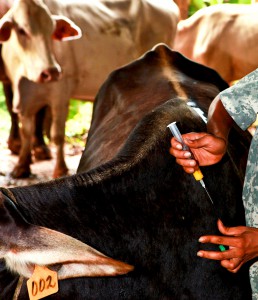The environmental and health impacts of growth hormones in cattle rearing
 A recent article published in the Journal of Soil and Water Conservation details the environmental and health effects associated with the agricultural use of growth hormones. The findings link the use of growth hormones in beef cattle production facilities with the occurrence of these potential endocrine-disruptors in surface and groundwater. Water contamination with these synthetic steroids has led to an increased concern about the agricultural use of growth hormones. Unfortunately, growth hormone presence in waterways has been linked to adverse endocrine-disrupting effects on aquatic and terrestrial life, including abnormal blood hormone levels, masculinization of females, feminization of males, altered sex ratios, intersexuality, and reduced fertility in fish. Additionally, continuous exposure to low hormone concentrations has been linked to adverse health effects in humans, such as increased incidence of cancers, sexual disorders, and a decline in human male-to-female ratios. This article stresses the importance of increased research on the use of growth hormones in cattle rearing, so that the economic advantages of their use don’t overshadow their negative health and environmental consequences.
A recent article published in the Journal of Soil and Water Conservation details the environmental and health effects associated with the agricultural use of growth hormones. The findings link the use of growth hormones in beef cattle production facilities with the occurrence of these potential endocrine-disruptors in surface and groundwater. Water contamination with these synthetic steroids has led to an increased concern about the agricultural use of growth hormones. Unfortunately, growth hormone presence in waterways has been linked to adverse endocrine-disrupting effects on aquatic and terrestrial life, including abnormal blood hormone levels, masculinization of females, feminization of males, altered sex ratios, intersexuality, and reduced fertility in fish. Additionally, continuous exposure to low hormone concentrations has been linked to adverse health effects in humans, such as increased incidence of cancers, sexual disorders, and a decline in human male-to-female ratios. This article stresses the importance of increased research on the use of growth hormones in cattle rearing, so that the economic advantages of their use don’t overshadow their negative health and environmental consequences.


